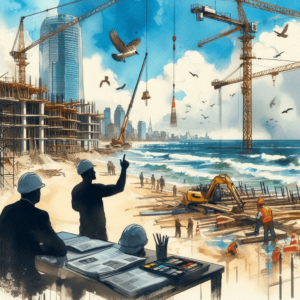Practice Areas
Construction Disputes in New Jersey: Why Legal Expertise Matters
 Construction projects are intricate undertakings. Multiple parties, detailed contracts, and substantial financial investments are all part of the equation. While many projects run smoothly, disputes can arise, causing delays, cost increases, and even legal battles. In New Jersey, navigating these disputes often requires the expertise of a qualified construction law attorney.
Construction projects are intricate undertakings. Multiple parties, detailed contracts, and substantial financial investments are all part of the equation. While many projects run smoothly, disputes can arise, causing delays, cost increases, and even legal battles. In New Jersey, navigating these disputes often requires the expertise of a qualified construction law attorney.
Contractual Challenges in Construction Disputes
One of the main reasons legal representation is crucial in construction disputes is the complexity of construction contracts. These contracts are often lengthy documents filled with technical jargon and intricate clauses. A skilled construction lawyer can decipher these contracts, identify potential areas of disagreement, and develop strategies to protect your interests.
Multiple Stakeholders and Competing Interests
Construction disputes frequently involve a variety of stakeholders, including contractors, subcontractors, suppliers, architects, and project owners. Each party may have conflicting interests and perspectives, leading to disagreements about issues such as payments, project delays, faulty workmanship, or breach of contract. A skilled lawyer can advocate for your rights and negotiate effectively on your behalf, striving for fair and favorable resolutions.
FAQs: Construction Disputes and New Jersey Law
Construction projects can be fertile ground for disagreements. If you’re facing a construction dispute in New Jersey, here are some frequently asked questions to help you navigate the situation:
1. What are common causes of construction disputes in New Jersey?
In addition to contract disputes that arise from misinterpretations of the construction contract, disagreements about the scope of work, or changes made during the project, payment disputes, project delays, contruction defects, and breach of contract are common.
- Payment disputes: Contractors or subcontractors may claim they are owed money for completed work, while owners may argue the work was not performed according to the contract.
- Project delays: Delays can cause financial strain and lead to disputes about who is responsible and the associated costs.
- Construction defects: Poor workmanship or faulty materials can lead to disagreements about repairs and who is responsible for the costs.
- Breach of contract: If either party fails to uphold their obligations as outlined in the contract, a breach of contract claim may arise.
2. What are my options for resolving a construction dispute in New Jersey?
There are several ways to resolve a construction dispute in New Jersey:
- Negotiation: This is often the first attempt to reach an agreement directly between the involved parties.
- Mediation: A neutral third party facilitates communication and helps both sides find a solution.
- Arbitration: A neutral arbitrator makes a binding decision on the dispute, similar to a judge.
- Litigation: If other options fail, a lawsuit may be filed in court to resolve the dispute.
3. When should I hire a construction lawyer in New Jersey?
Construction law can be complex, and even seemingly minor disputes can have significant financial implications. Here are some situations where consulting a construction lawyer is recommended:
- The dispute involves a substantial amount of money.
- The contract is complex or there is a disagreement about its interpretation.
- You are unsure of your rights or how to proceed.
- The other party has legal representation.
- You are considering filing a lawsuit or going to arbitration.
Finding the Right Construction Lawyer in New Jersey
Construction disputes in New Jersey demand the expertise of skilled lawyers who understand the intricacies of construction law and can effectively navigate the complexities of contractual disputes. By consulting with a qualified construction lawyer early on, you can protect your rights and increase your chances of a favorable outcome.
Andrew Krantz of Zager Fuchs exemplifies the kind of legal representation essential for achieving successful outcomes in construction disputes, ensuring you can mitigate risks and safeguard your investments in construction projects.
